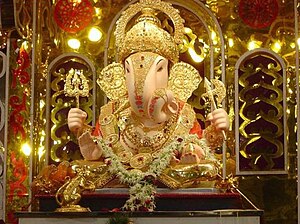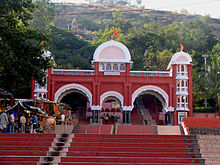Culture of Pune
This article's tone or style may not reflect the encyclopedic tone used on Wikipedia. (February 2015) |
Pune is considered by many to be Maharashtra's cultural capital and the form of Marathi spoken in Pune is considered to be the standard form of the language.[1] The culture of Pune encompasses both the traditional Maharashtrian lifestyle that is prevalent in the heart of the city, as well as a modern, progressive outlook resulting from its being a hub for education and liberal thought. People from multiple religions and speaking different regional languages reside here. It also hosts various nat and cultural events throughout the year. Due to a large student population, Pune also hosts many youth festivals.
Ganapati (Ganesh) Festival


It was in Pune in 1894 that Bhau Rangari initiated the concept of the "Sarvajanik Ganeshotsav" — the collective communal celebration of the festival of Lord Ganesha. During the month of August or September each year, the city celebrates the Hindu festival of Ganesh Chaturthi. Almost every neighborhood puts up a pandal with an idol of Lord Ganesha, often amidst a mythological setting, complete with decorative lights and festive music. The 10-day festival culminates in a carnival-like procession along the busy thoroughfares of the city, with every pandal leading the idol on a float to finally immerse (visarjan) it in the local rivers. This is one of the most important yearly events in the city. There are many pandals set up in important places of the city. The city has the five Maanache Ganpati- The respected Ganpati- at different places. They are the Kasba Ganpati at Kasba Peth, Tambdi Jogeshwari Ganpati at Appa Balwant Chowk, Guruji Talim at Laxmi Road, Tulshibaugh Ganpati at Tulshibaugh and Kesariwada Ganpati at Kesariwada, the ancestral home of the Tilaks. Every year, the Dagdusheth Halwai Ganpati trust creates a pandal which is a replica of famous monuments and temples in India. In 2014, it was the replica of the Kailash Temple at Ellora.
Concerns about pollution in Pune rivers has led to the growing use of eco-friendly and biodegradable materials in the manufacture of idols of Lord Ganesha. Over some places the processions are also banned to help reduce the noise and air pollution.
During this time, the Maharashtra Tourism Development Corporation organises the month-long Pune Festival which hosts classical dance and music recitals, a film and drama festival, automobile rallies and some traditional sports.
Religion

The "Tambadi Jogeshwari" is the goddess of the city - Gramdevi. The temple was built in 15th century. The Kasba Ganapati is (gramadevata) of the city. The temple was built in 16th century. It occupies the premier position amongst the idols during Ganpati Festival. The procession of Ganpati Festival begins from this temple. Another important temple in the city is Sarasbaug Ganpati built by Srimant Sawai Madhavrao Peshwe on a small island in Saras Lake. The Chaturshringi goddess is the other most important deity of the city of Pune. A temple dedicated to the goddess is situated on the slopes of a mountain in the northwest part of the city. In the month of September there is a huge procession for the Navaratris and people flock in to visit and receive blessings of the Goddess.
Another famous temple is the Parvati Temple, located on a hill in Pune.
Pune was also home to a considerable population of the Indian Jewish community, the Bene Israel. It is home to Asia's largest synagogue (outside Israel), The Ohel David Synagogue (Popularly called Lal Deval - the Red Temple ).
The Sadhu Vaswani Mission is a noted charitable, religiously inclined, organisation based in Pune. It is engaged in various philanthropic activities in fields such as education, healthcare, social service, animal rights, feeding of the poor and spiritual upliftment. It's spiritual head is the educationist, poet, U Thant Peace Award winner and modern saint J. P. Vaswani.
Close to Pune, near the Malavali hills, is the Vedanta Academy,[2] founded by one of the world's most noted exponents of Vedanta, Swami Parthasarathy. The academy offers free Vedantic education to young seekers from all corners of the world.
The Shrutisagar Ashram,[3] located at Phulgaon village off Ahmednagar road, houses the Vedanta Research Center and a unique temple of Lord Dakshinamurthy situated near the confluence of rivers Bhima, Bhama and Indrayani. It was established in 1989 by Swami Swaroopanand Saraswati. Here one can find detailed Marathi and English explanations of the great 'Shruti' and 'Smruti' which include Vedas, Bhagwat Gita, Upanishads and Purana.
Radha Kunjbihari temple, situated at the heart of the city is becoming attraction for the thousands of youths across the India. This temple belongs to ISKCON(International Society for Krishna Consciousness).
Spirituality

Rajneesh resided and taught in Pune for much of the 1970s and 1980s; he died here. The Osho International Meditation Resort of the Rajneesh movement is located in the Koregaon Park area.[4] Pune is also the birthplace of spiritual guru Meher Baba.
Yoga Master B. K. S. Iyengar established his Yoga Institute in Pune.
Close to Pune are the villages of Alandi and Dehu where Jñāneśvar and Tukaram lived during the 13th and 17th centuries, respectively. Each year, thousands of pilgrims from all over Maharashtra gather here and start the vari, a procession carrying litters of Jñāneśvar and Tukaram to Pandharpur. Pandharpur has a temple to Viṭhobā and is about 300 kilometres (190 mi) from Pune. All pilgrims walk this distance to reach Pandharpur on the auspicious days of 'Aashadhi Ekadasshi' and 'Kartiki Ekadasshi' when the Vari ends.
Sawai Gandharva Music Festival
In December Pune hosts the Sawai Gandharva Music Festival. It is dedicated to the classical forms of music — both Hindustani and Carnatic. Many renowned artists perform through 3 consecutive days creating a hype unique to this city. It is one of the most eagerly awaited festivals in the city, and it attracts music lovers from Pune and other parts of Maharashtra and India.
Shaniwarwada Dance Festival
In the bracing winter air, Pune has had the privilege of seeing some of the best exponents of dance. World-renowned classical dancers like, Pt. Birju Maharajji, the doyen of the kathak, the legendary maestro Padma Vibhushan Guru Kelucharan Mohapatra, along with his son Ratikant and daughter in law Sujata Mohanty presented the graceful lyrical dance style from the eastern shores of our country. The beautifully illuminated Shaniwarwada is an ideal backdrop which when combined the melodious sound of ghungroos creates a magical aura under the twinkling stars. The rich cultural heritage of Pune is brought to life with a perfect blend of history, music and dance.
The Shaniwarwada Dance Festival held under the auspices of The Pune Festival.[5]
Literature and Theatre
Pune has given birth to or attracted a body of organisation for the Marathi literati. Marathi theatre (Drama नाटक — रंगभूमी ) is an integral part of Marathi culture. Both — Experimental (प्रायोगिक रंगभूमी) and Professional Theatre — receive whole-hearted patronage from the Marathi community. Tilak Smarak Mandir, Bala Gandharva Rangmandir, Bharat Natya Mandir, Yashwantrao Chavan Natyagriha and Sudarshan Rangmanch continue to serve these art forms.
Pune have several arts institutes.
Historical and architectural Attractions
Apart from its various temples, other historical attractions in and around Pune include the rock-cut Pataleshwar cave temple, Aga Khan Palace, Shaniwarwada, Lal Mahal, Shinde Chhatri and Sinhagad fort.
The city is also known for its British Raj "bungalow architecture" and the Garden Cities Movement layout of the Cantonment in the early Twentieth Century. Christopher Charles Benninger landmark architectural works surround the city, including the Mahindra United World College of India, the Centre for Development Studies and Activities, the YMCA Retreat at Nilshi and the Samundra Institute of Maritime Studies.
Museums, Parks and Zoos
Prominent museums in Pune include the Raja Dinkar Kelkar Museum, Mahatma Phule Museum, Babasaheb Ambedkar Museum, Pune Tribal Museum and the National War Museum.
Pune has a number of public gardens, such as the Kamala Nehru Park, Sambhaji Park,[6] Shahu Udyan, Peshwe Park, Saras Baug, Empress Garden and Bund Garden. The Pune-Okayama Friendship Garden is located on Sinhagad road, and is also named as Pu La Deshpande Udyan. It is a recreation of the Korakuen Garden in Okayama, Japan.[7]
The Rajiv Gandhi Zoological Park is located at Katraj, close to the city.[8] The zoo, which was earlier located at Peshwe Park was merged with the reptile park at Katraj.
Food
Pune has a variety of foods and cuisines. A common meal item is bhakri-pitla, or flat millet pancakes and flour-based curry. Savoury items such as chivda and bakarvadi, and sweets are available in various shops and restaurants. Street vendors also offer snacks such as Vada pav, Bhelpuri, Misal and Kutchi Dabeli. One can also find the Mastani, a thick milkshake with dried fruits, which is named after Queen Mastani of the Peshwas.
Several restaurants in Pune offer Udupi cuisine, Kolhapuri cuisine, Maharashtrian cuisine and other Indian and Western cuisines. Pune has many dining Halls spread out across the city catering to students and office goers. These are modest sit-down eateries that serve all-you-can-eat meals at affordable prices. Indian and western fastfood franchises such as Pizza Hut, Domino's, McDonalds, Subway, Smokin Joes and Papa Johns have outlets in the city, and are comparatively more expensive. There are several coffee houses (including Irani cafes) and modern chains such as Cafe Coffee Day, Aromas Cafe and Barista Coffee.
Entertainment
Pune has many multiplexes and cinema theatres, showing the latest Bollywood and Hollywood movies. These multiplexes are situated in various parts of the city. Marathi movies are screened at Prabhat and City Pride. Multiplexes include INOX near Pune station, E Square on University road, City Pride on Satara road, City Pride at Kothrud, City Pride at Deccan, BIG Cinemas at Kalyani Nagar and Chinchwad, Fame at Akurdi and Wanowarie, Pimpri-chinchwad,Mangala at Corporation. Other than the cinema there are various other leisure facilities such as go-karting at Manas Resorts and the Pancard club.[9] a bowling alley at 3D Destination[10] Pune Theatres and Cinema Halls
Pune is becoming a good party destination with people from multinational cultures flocking to Pune. Discos, pubs and bars are becoming common in Pune.
References
- ^ "Marathi language".
- ^ [1]
- ^ "SHRUTISAGAR ASHRAM".
- ^ Virtualpune.com. "Pune Attractions - Osho International Meditation Resort, Osho, Osho meditation, Osho resort, places to visit in Pune".
- ^ "Shaniwarwada Dance Festival".
- ^ [2]
- ^ "A Japanese paradise in Pune - Times of India".
- ^ "Latest News, Breaking News Live, Current Headlines, India News Online - The Indian Express".
- ^ Go Karting at Pancard club
- ^ "歯科で治療を受けて口内の健康キープ|歯が無い人生は儚いよ".

